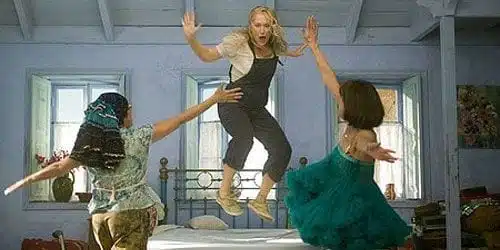
Sophie Sheridan (Amanda Seyfried) is a 20-year-old living on a Greek island with her free-spirited mother, Donna (Meryl Streep). Soon to be married to Sky (Dominic Cooper), Sophie has one wish for her wedding: that her father gives her away. The problem is, Sophie doesn’t know who her father is.
Desperate to find him and to make her wish come true, she reads her mother’s diary from the summer she was conceived and learns that there were three men in her mother’s life — Sam Carmichael (Pierce Brosnan), Harry Bright (Colin Firth) and Bill Anderson (Stellan Skarsgard). Sophie writes to them all in the guise of her mother and invites them to her wedding with the hopes that she will recognize her father on sight; that man, according to her girlish fantasy, will be the man who gives her away.
Mamma Mia!, the Abba musical adapted from the hit Broadway show, is the kind of movie whose campiness you just have to give into if you want to enjoy it. I like Abba songs — thankfully, as the film doesn’t go for 15-minutes without a character breaking into song — and I liked the charming cast, so this wasn’t hard for me. Even Pierce Brosnan, who sings like he’s struggling not to choke on a hambone or battling killer indigestion, can’t ruin the joyous Mamma Mia!
It opens with the movie’s strongest singer, the wonderful Amanda Seyfried. (All of the actors, for better or worse, sing their own songs.) As she sings “I Have a Dream”, we see her drop three envelopes into the mail to each of her potential fathers. Soon after, in a scene in which she’s telling her friends about reading her mother’s diary, she breaks into a cheeky version of “Honey, Honey”, imagining, from her mother’s point of view, that wild summer of love: “Honey, Honey, oh, how you thrill me!” This is a perfect example of how the Abba songs, rather than being a weird distraction, in fact help to flesh out the story and a character’s personality. In a short time, we understand Sophie’s poignant longing to know her absent father and we’re reminded how young she is, giggling like a teen about her mother’s formerly wild ways.
Meryl Streep proved in Adaptation that she is hilarious if given the right material, and she really lets loose in Mamma Mia!. Traipsing around the island in overalls and sneakers, Streep as Donna is a middle-aged baby boomer, and her blond hair and goofy gait make her resemble her young daughter from far away. Although Streep’s voice isn’t as technically lovely as Seyfried’s, her acting fills in where the notes crack. During the most moving song of the film, “Slipping Through My Fingers,” it’s easy to forget that Streep is singing as she bids her daughter goodbye on the eve of her wedding, so well does the song, and her performance, work to heighten emotion rather than call attention to itself.
One shouldn’t get the impression that Mamma Mia! is over serious or maudlin, though, at least most of the time. Shortly after Donna’s best friends, the high maintenance Tanya (Christine Baranski) and eccentric Rosie (Julie Walters), arrive on the island, Donna reveals that she is upset that these men from her past have arrived right before Sophie’s wedding, and that she doesn’t know which one is Sophie’s father. “I was a stupid reckless little slut,” she says, despondently. “You sound like your mother!” rebukes Tanya, and in place of the requisite chick flick pep talk, Tanya and Rosie sing “Dancing Queen” with sex toys as microphones while Donna jumps up and down on her bed. In the world of Mamma Mia!, being middle aged means never having to say you’re sorry.
And what about the men? In a funny interview with Stellan Skarsgard in the DVD bonus disc, he says, “This film is written, produced, directed and designed by women, which means that we three men are the bimbos of the film.” Although this is an exaggeration, and the film does give us a sense of their own histories and middle-aged regret, let’s just say that the men in this film are easy on the eyes. And then there’s the dance sequence involving at least 30 shirtless men dancing on a pier…
Ultimately, what makes Mamma Mia! work is that, like an Abba song, deep emotions, good writing, and spirited performances are wrapped up in a disarmingly fun package. This romantic comedy, drama, and musical hybrid, mimics the teen emotions of an Abba song, never letting sadness get in the way of joy. Stripped of irony (or at least grooving on its own campiness), filled with sweetness, and longing for an unembarrassed hope, Abba is a guilty pleasure. And I suspect Mamma Mia! will become one, too.
Bonus features include sing-along on-screen lyrics; interviews with Abba member Bjorn Ulvaeus, the actors, director, producer and screenwriter; outtakes; deleted scenes; and
behind-the-scenes rehearsals showing the actors learning how to sing.
